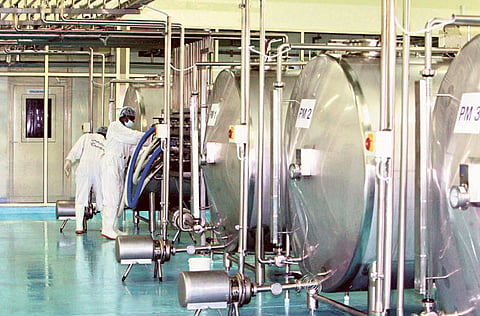Camels are the new cash cow for the UAE
Emiratis and Arabs account for 75% of sales of camel products

Dubai: A train of camels against a desert backdrop has long been an integral feature of the UAE's tourist branding. Now the camel has become much more than just a cultural fixture:its products are proving popular in the local and global markets.
The UAE has more than 300,000 camels that produce 40,000 metric tonnes of milk annually.
They are mostly concentrated in the country's two camel farms: Al Ain Dairy and the Emirates Industry for Camel Milk and Products which produce Camelait and Camelicious brands.
Since its launch in 2006, Camelicious sales have grown steadily, up almost 100 per cent for the first three-and-a-half years and then at an average of 25 to 30 per cent every year.
The plain milk generates 80 per cent of the revenue. The brand's most popular flavours include date, saffron, chocolate and strawberry, says Ashraf, marketing manager at Camelicious.
Camel milk products have proved popular as both a niche and tourist product. Its health properties are also a big selling point.
Compared to cow's milk it has five times more vitamin C, is rich in minerals, has less fat, less lactose and more insulin, making it a good option for diabetics and the lactose intolerant.
Emiratis and Arabs contribute to 75 per cent of the local sales while Asia makes up 15 per cent and Europe and America make up 10 per cent.
Al Ain Dairy reports similar demand. "Demand is very high and is increasing based on the increase in awareness of the product and in its associated health benefits. Our main demographic is the UAE, although we are seeing a definite pattern emerging of increasing expat awareness," April Dawn, PR manager at Al Ain Dairy told Gulf News.
On the back of growing demand, Al Ain Dairy recently announced plans to invest in their camel milk production facilities by developing the technology with British technology partners Fullwood Ltd.
"Much has been made recently of the global increase in camel milk demand and there is no doubt about it, Al Ain Dairy is actively preparing for an increase in international consumption," said Shashi Menon, COO of Al Ain Dairy.
Regionally, Emirates Industry for Camel Milk and Products export to Jordan, Maldives and Kuwait with a few shipments to South Africa. They are also in talks with distributors from Qatar, Malaysia, Singapore and Brunei.
EU restrictions
However, despite demand coming from international markets, camel milk has come up against import restrictions from the European Union which also affects the US, Canadian, Chinese and Hong Kong markets.
The EU recently rejected a UAE proposal to export camel milk products which means the milk will not be exported for at least another two years. According to the report, nine requirements had to be met before the products could be exported, including new rules for disease control and an animal health law.
"Our products have already met EU regulations since inception, as we are an ISO certified organisation we need not change or alter any practices or initiatives except fine tuning a few procedures and it's all done at our level. At the same time the Ministry of Water and Environment and Dubai Municipality were taken on board for this project and currently they are in talks with the EU for final approvals," said Ashraf.
Al Ain Dairy currently supplies only to the UAE where demand has begun to outweigh current production levels.
"Al Ain Dairy views possible entry into the global market with cautious optimism but is already active in its preparation and planning for the future in this regard. The prospect of exporting ultra-fresh camel milk presents many challenges, not least in terms of supply chain and logistics. Perhaps the main one to overcome is how to produce a long-life product that is stable enough to market in TetraPack format," said Dawn.
However the ban on milk exports has not affected Al Nassma, a local company which specialises in gourmet chocolates made from camel milk. The company which is already present in the Japanese and some European markets has recently launched its products in Switzerland, the capital of chocolates.
Starting next month, Al Nassma will be available in 60 outlets all over Switzerland in competition with some of the world's most renowned chocolate brands.
"Global demand from gourmet shops and high-end department stores is amasing and our forecast is that within a short period of time, 70 per cent of our products will be exported," Martin van Almisick, general manager of Al Nassma Chocolate, told Gulf News.
The chocolates, which are shaped like camels, are found in five-star hotels in the UAE including the Burj Al Arab, Bab Al Shams, Emirates Towers, Atlantis, Kempinski, Grand Hyatt and Dubai Duty Free.
"Plenty of orders were recorded during Ramadan and the recent Eid Al Adha. Valentines will be especially big for us in the coming year in the US and Japan and we are currently preparing those orders," said van Almsick.
Al Nassma also sells camel-themed hot drinks such as Camelattes and Camelcinos and has plans for more spin-off products such as camel milk ice cream.



